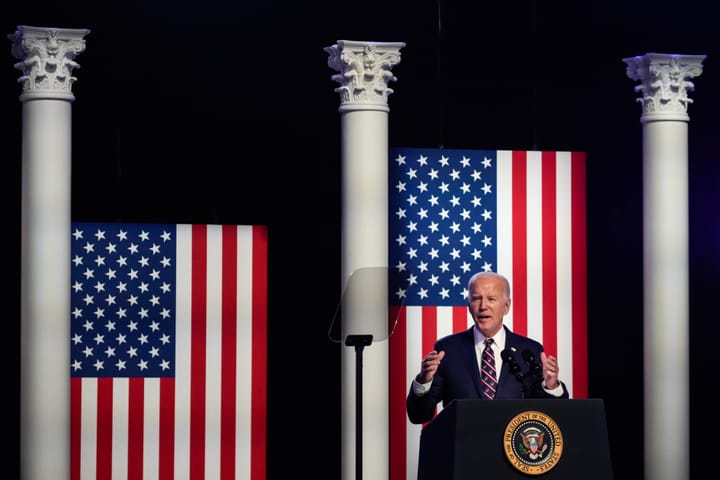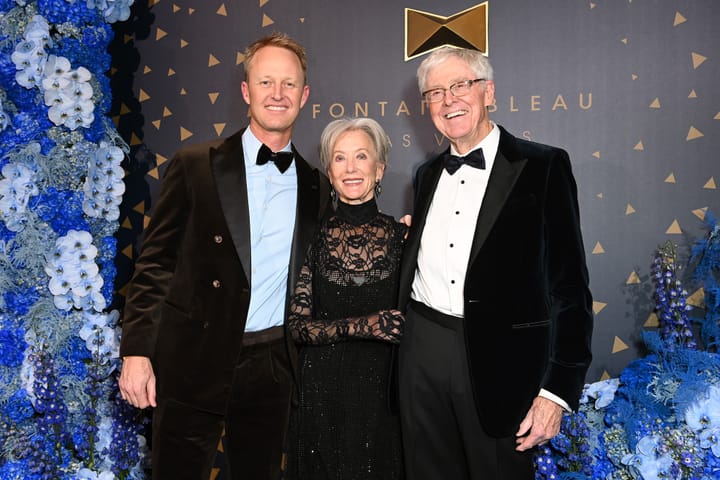This piece was co-produced by Important Context and Sludge.
A public charity associated with one of the nation’s largest Democratic outside spending operations has been raking in millions of dollars and passing money on to one of the organization's political arms, federal tax records reveal.
For years, the Priorities USA Foundation, a tax-exempt 501(c)(3) charity, has been funneling money to an affiliated 501(c)(4) “social welfare” group, Priorities USA. Both nonprofits fall under the same organizational umbrella as Priorities USA Action, one of the largest and most powerful Democratic super PACs in the country. Founded in 2011 by two former aides to Barack Obama, the group is so big, it “has no peer,” according to the New York Times. In the 2020 presidential race, it spent the third highest amount among all outside spending groups.
Since 2018, the Priorities USA Foundation has provided an amount of money roughly equal to 70 percent of what it received in contributions and grants over that period to its social welfare affiliate. The percentage has been trending higher in recent years. In 2022, for example, it moved roughly $10 million—equal to nearly 96 percent of what it raised in contributions and grants for the year—to its 501(c)(4) arm, roughly a third of what the social welfare group raised that year. The contribution was marked in its tax filing for “voter access litigation and digital communications,” two areas the social welfare group has been focused on.
According to the Priorities USA social welfare group’s Internal Revenue Service Form 990 filing for 2022, the group raised $27 million in contributions and grants and the overwhelming majority of its spending—nearly $26 million—went to “mobiliz[ing] Americans on the issues that impact their lives through…long-term research, digital, and communications programs.” The group specified that it “conducted research on how best to reach people most impacted by policy decisions, and ran innovative digital ad programs.” The filing reveals that $20 million went specifically to “advertising and promotion.” Another $4 million was spent for ballot access litigation.
While Priorities USA says it spent a significant amount of money on voting issues—in September 2022, the group announced $5 million in spending on “combating voter suppression” as part of a $20 million commitment it made in 2021—it said it was spending even more on politics.
In January 2022, Priorities USA announced a $30 million “investment in digital mobilization and persuasion efforts that will reach voters in battleground states ahead of the 2022 midterm elections.” The group noted that its work would “put Democrats in a strong position to protect and expand majorities in 2022 and build a necessary foundation in presidential battleground states ahead of 2024.”
Both Priorities USA’s chairman, Guy Cecil, and executive director, Danielle Butterfield, were quoted in the press release, touting the group’s digital efforts to help Democrats.
"I am confident that Priorities USA is in the best position possible to defend and expand Democratic majorities this November, and create a strong foundation for Democratic victories for years to come,” Cecil’s statement read.
"While Joe Biden and Democrats fight for working families in Washington and state capitals, Priorities USA can be counted on to continually engage with voters and earn their support to protect and expand Democratic majorities,” read Butterfield’s. “This investment is only the beginning of Priorities’ efforts to reach voters where they are on the issues they care about.”
A donation plea at the bottom of the press release read: “Elect more Democrats.”
While both charities and social welfare groups are tax exempt, donations to the former are tax deductible. However, the Internal Revenue Code stipulates that such organizations are “absolutely prohibited from directly or indirectly participating in, or intervening in, any political campaign on behalf of (or in opposition to) any candidate for elective public office.” With social welfare nonprofits, the opposite is true: Donations are not tax deductible, but the groups are able to engage in political campaigns so long as that intervention does not constitute the group’s primary activity, which is an imprecise metric generally meaning less than half of activities.
The IRS determines whether an activity constitutes “political campaign activity” by looking at several factors, including whether or not the statement identifies a candidate, expressly approves or disapproves of a position taken by a candidate, is timed close to an election, references voting or an election, is part of broader advocacy not tied to an election, and is timed with a non-electoral event like a vote on legislation.
Legal experts told Important Context and Sludge that a money transfer from a 501(c)(3) to a politically engaged 501(c)(4) raised questions, particularly around the kinds of activities the funds supported.
Law professor Roger Colinvaux at the Catholic University, whose expertise includes nonprofits and philanthropy, said that while the transfers are more than likely legal, they likely not “not the intent at all of the overall legal structure.”
“Basically, you can think of the [501](c)(3)/(c)(4) money flow as totally fine in theory, as long as the money is used for a genuine charitable purpose or program, and the (c)(3) board is charged with just making sure that those charitable assets are used for charitable purposes,” Colinvaux explains. “So, that's how it's supposed to work. Of course, how it actually works is going to be very different, because the IRS is not not very present in enforcing the law in this area.”
Priorities USA did not respond to a request for comment.
The practice of passing money from a 501(c)(3) charity to a (c)(4) social welfare group is a common one. The League of Conservation Voters Education Fund, an environmental advocacy charity, gave $16,000,000 to an affiliated (c)(4), League of Conservation Voters Inc., in 2022. That same year, the social welfare group, which brought in $68.5 million, gave $30 million to a super PAC, the League of Conservation Voters Victory Fund.
David Willett, the senior vice president of LCV, noted that his organization takes compliance “very seriously.”
“LCV entities fully comply with all relevant rules and no LCV Education Fund grants are used for impermissible electoral purposes,” he explained. “LCV Education Fund’s grant to LCV restricts the use of the funds for non-electoral work, and the grant is monitored to adhere to the restrictions. Separately, LCV as a 501c4 is permitted to engage in electoral activities as long as they are not its primary purpose, and we ensure that any donations to LCV Victory Fund are made from funds that are not restricted for non-electoral use.”
The charity-to-social-welfare money flow is common on both sides of the aisle. According to its IRS Form 990, by comparison, the Heritage Foundation, the most powerful conservative think tank in the country, gave $400,000 in 2022 to its sister organization, Heritage Action for America, a 501(c)(4) political advocacy group that fights for right-wing policies by lobbying and mobilizing activists.
Heritage has an affiliated super PAC called The Sentinel Action Fund, and Heritage Action for America has been its largest donor, providing it nearly $5 million since 2022, according to FEC data.
“We deploy our well-respected government relations team to directly meet with and influence lawmakers,” Heritage Action for America’s website boasts. “Outside Washington, D.C., our regional field staff works directly with leading grassroots activists to build support for conservative policies in a lawmaker’s backyard. Both teams work together to hold members of Congress accountable to their constituents, advance conservative policy, and block big-government policy.”
While on its face, Heritage Action is nonpartisan, the group and its affiliate charity generally favor the GOP. Heritage Action’s first major advocacy campaign was an effort to repeal former President Barack Obama’s signature healthcare law, the Patient Protection and Affordable Care Act, ahead of the 2010 midterms. Today, with the 2024 election heating up and Congress seeking a compromise on immigration reform and foreign aid, the group has a toolkit on its website titled, “Biden’s Funding Request Fails America.”
Heritage did not respond to a request for comment.


